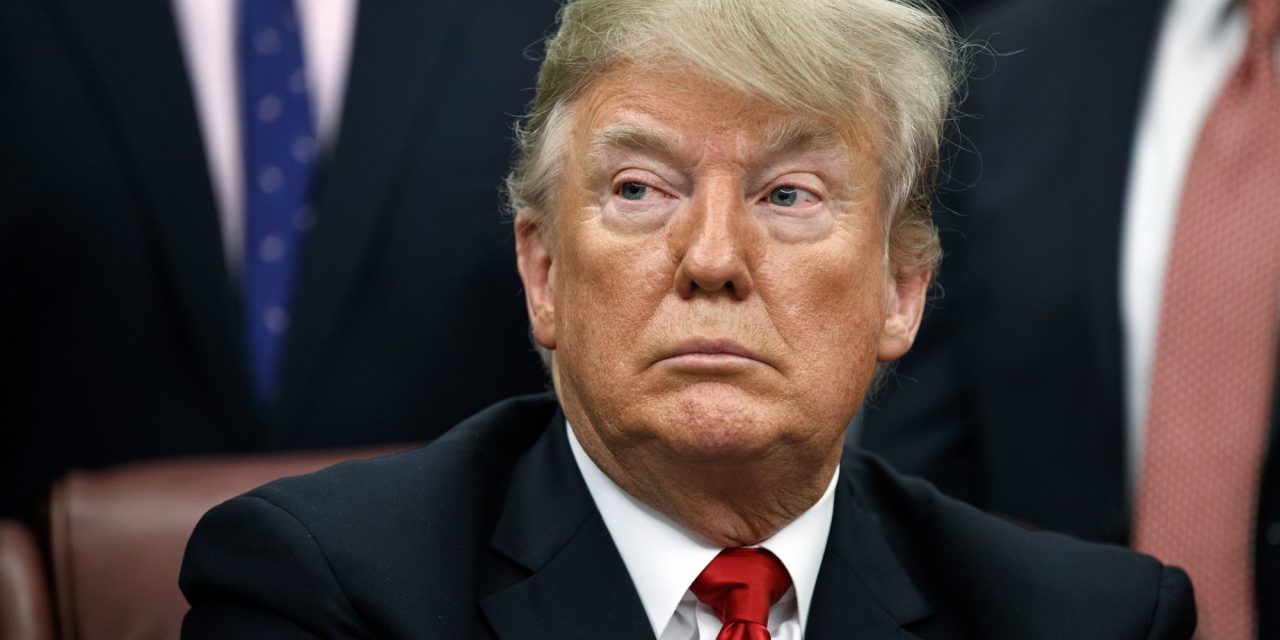Image Credits: Evan Vucci / AP.
When acting White House chief of staff Mick Mulvaney stepped to the mic on Thursday to address the press corps, he thought he’d be creating controversy by announcing that the 2020 G-7 conference would be held in one of the president’s own resorts. He was correct about that, but he did far more damage by his admission that there had been a quid pro quo of dirt on the Democrats in exchange for military aid to Ukraine, and that we should all just “get over it.”
White House ally Sean Hannity was unimpressed:
“What is Mulvaney even talking about?” Sean Hannity, a Fox News host and confidant of the president’s, said on his radio show Thursday afternoon, referring to what he called the acting chief of staff’s “idiotic interpretation of things.”
“I just think he’s dumb, I really do. I don’t even think he knows what he’s talking about,” Mr. Hannity said.
It won’t be possible to undo the damage from the Ukraine admission, although Mulvaney made a very unsuccessful attempt to reverse his position during a Sunday appearance on Fox News. Yet, as the New York Times reports, the decision on the G-7 conference proved even more immediately untenable.
The president first heard the criticism of his choice of the Doral watching TV, where even some Fox News personalities were disapproving. By Saturday afternoon, his concerns had deepened when he put in a call to Camp David, where Mr. Mulvaney was hosting moderate congressional Republicans for a discussion of issues facing them, including impeachment, and was told the consensus was he should reverse himself. Those moderates are among the votes Mr. Trump would need to stick with him during an impeachment.
By Saturday night, the president was convinced they he couldn’t stick by his decision on the G-7 and reversed himself on Twitter. He blamed the media and the Democrats, of course, but it was Republican pushback that forced his hand. The same can be said of his decision to leave some troops in Syria, where his announced withdrawal had caused immediate humanitarian and geopolitical catastrophes.
These three reversals, on Syria, Ukraine and his Doral resort are significant because they represent a break from the crisis management style Trump learned from his old friend Roy Cohn.
Beneath the surface, though, Trump had connections that help explain how he came to launch a demagogic political career based on the racist and transparently inane theory that Barack Obama was born in Kenya and therefore ineligible to serve as our president.
First among them was Trump’s long relationship with the lawyer Roy Cohn. Cohn is most famous for his role as chief counsel to Sen. Joseph McCarthy. In that role, he led the aggressive and unethical red-baiting Permanent Subcommittee on Investigations until the U.S. Army pushed back and he was forced to resign in August 1954. In private practice, Cohn represented prominent New Yorkers like la cosa nostra crime boss Carlo Gambino, Francis Cardinal Spellman and Yankees owner George Steinbrenner, but was frequently at odds with the law. Over the years, he won four separate acquittals on charges varying from conspiracy, securities fraud, bribery, and obstruction of justice before finally being disbarred in 1986 as he was dying of HIV. What Cohn learned from McCarthy was the value of being dramatic and the utility of exaggerated claims and accusations. He passed these lessons along to Donald Trump.
According to Trump, he first met Roy Cohn in a members-only Midtown establishment called Le Club. It was 1973, and the government was accusing the Trumps of discriminatory housing practices. He asked Cohn, “The government has just filed suit against our company saying that we discriminated against blacks. What do you think I should do?” Cohn advised him to “Tell them to go to hell and fight the thing in court and let them prove you discriminated.”
The Trumps retained Cohn to represent them and Donald became his student. According to author Sam Roberts, it was from Cohn that Trump learned his now familiar three-part strategy for handling litigation which he has now transferred to political combat: 1. Never settle, never surrender. 2. Counter-attack, counter-sue immediately. 3. No matter what happens, no matter how deeply into the muck you get, claim victory and never admit defeat.
If nothing else, it’s fair to say that Donald Trump doesn’t like to reverse decisions or admit mistakes. It goes against his training and he considers it a losing strategy. Even when he is convinced that surrender is the best option, he resents the advice and eventually turns on the advisers.
Yet, the president finds himself in a very vulnerable position now, and he can’t afford to ignore the opinions of congressional Republicans if he hope to win an acquittal in his inevitable trial in the Senate. Already, he’s almost certain to see some defections from House Republicans during the vote on impeachment. The more bipartisan the impeachment vote is, the harder it will be for Republican senators to paint the whole things as a partisan witch-hunt.
This is why Trump has been in full retreat over the last week. Congressional Republicans did not consider his positions on Syria, Ukraine and the G-7 were not defensible and so the lines were abandoned and mitigation efforts were attempted.
It’s not a promising place to begin what will probably prove to be the worst week yet for Trump and his horrid presidency.







